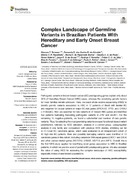Use este identificador para citar ou linkar para este item:
https://repositorio.ufrn.br/handle/123456789/25458Registro completo de metadados
| Campo DC | Valor | Idioma |
|---|---|---|
| dc.contributor.author | Torrezan, Giovana T. | - |
| dc.contributor.author | Almeida, Fernanda G. dos Santos R. de | - |
| dc.contributor.author | Figueiredo, Márcia C. P. | - |
| dc.contributor.author | Barros, Bruna D. de Figueiredo | - |
| dc.contributor.author | Paula, Cláudia A. A. de | - |
| dc.contributor.author | Valieris, Renan | - |
| dc.contributor.author | Souza, Jorge E. S. de | - |
| dc.contributor.author | Ramalho, Rodrigo F. | - |
| dc.contributor.author | Silva, Felipe C. C. da | - |
| dc.contributor.author | Ferreira, Elisa N. | - |
| dc.contributor.author | Nóbrega, Amanda F. de | - |
| dc.contributor.author | Felicio, Paula S. | - |
| dc.contributor.author | Achatz, Maria I. | - |
| dc.contributor.author | Souza, Sandro José de | - |
| dc.contributor.author | Palmero, Edenir I. | - |
| dc.contributor.author | Carraro, Dirce M. | - |
| dc.date.accessioned | 2018-06-19T13:52:32Z | - |
| dc.date.available | 2018-06-19T13:52:32Z | - |
| dc.date.issued | 2018-05-07 | - |
| dc.identifier.citation | TORREZAN, G.T. Complex landscape of germline variants in brazilian patients with hereditary and early onset breast cancer. Front. Genet., v.9, n.161, maio/2018. | pt_BR |
| dc.identifier.issn | https://doi.org/10.3389/fgene.2018.00161 | - |
| dc.identifier.uri | https://repositorio.ufrn.br/jspui/handle/123456789/25458 | - |
| dc.language | eng | pt_BR |
| dc.rights | Acesso Aberto | pt_BR |
| dc.subject | cancer predisposition genes | pt_BR |
| dc.subject | hereditary breast cancer | pt_BR |
| dc.subject | whole-exome sequencing | pt_BR |
| dc.subject | germline pathogenic variants | pt_BR |
| dc.subject | cancer susceptibility | pt_BR |
| dc.subject | DNA repair genes | pt_BR |
| dc.title | Complex landscape of germline variants in brazilian patients with hereditary and early onset breast cancer | pt_BR |
| dc.type | article | pt_BR |
| dc.description.resumo | Pathogenic variants in known breast cancer (BC) predisposing genes explain only about 30% of Hereditary Breast Cancer (HBC) cases, whereas the underlying genetic factors for most families remain unknown. Here, we used whole-exome sequencing (WES) to identify genetic variants associated to HBC in 17 patients of Brazil with familial BC and negative for causal variants in major BC risk genes (BRCA1/2, TP53, and CHEK2 c.1100delC). First, we searched for rare variants in 27 known HBC genes and identified two patients harboring truncating pathogenic variants in ATM and BARD1. For the remaining 15 negative patients, we found a substantial vast number of rare genetic variants. Thus, for selecting the most promising variants we used functional-based variant prioritization, followed by NGS validation, analysis in a control group, cosegregation analysis in one family and comparison with previous WES studies, shrinking our list to 23 novel BC candidate genes, which were evaluated in an independent cohort of 42 high-risk BC patients. Rare and possibly damaging variants were identified in 12 candidate genes in this cohort, including variants in DNA repair genes (ERCC1 and SXL4) and other cancer-related genes (NOTCH2, ERBB2, MST1R, and RAF1). Overall, this is the first WES study applied for identifying novel genes associated to HBC in Brazilian patients, in which we provide a set of putative BC predisposing genes. We also underpin the value of using WES for assessing the complex landscape of HBC susceptibility, especially in less characterized populations. | pt_BR |
| Aparece nas coleções: | ICe - Artigos publicados em periódicos | |
Arquivos associados a este item:
| Arquivo | Descrição | Tamanho | Formato | |
|---|---|---|---|---|
| SandroSouza_ICe_Complex landscape_2018.pdf | SandroSouza_ICe_Complex landscape_2018 | 884,06 kB | Adobe PDF |  Visualizar/Abrir |
Os itens no repositório estão protegidos por copyright, com todos os direitos reservados, salvo quando é indicado o contrário.

